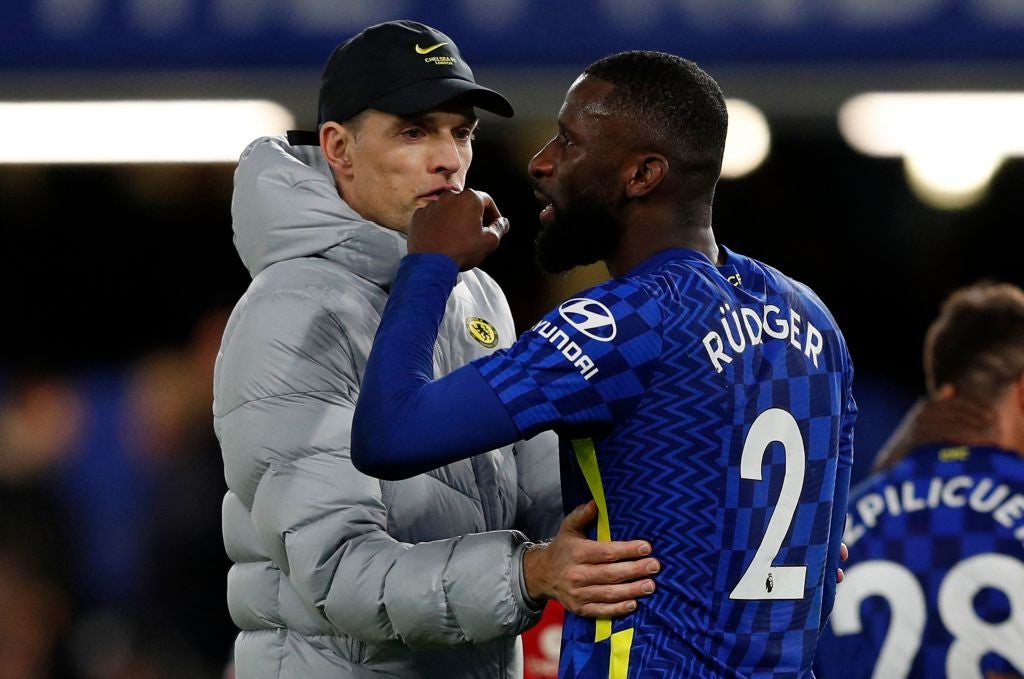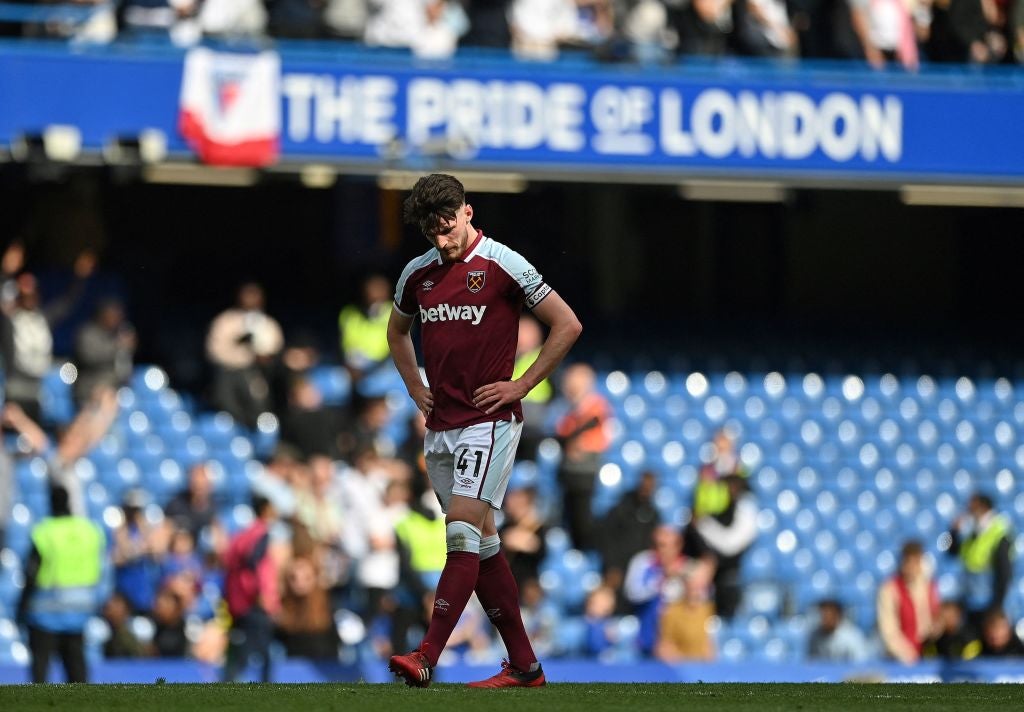
The events of Sunday at Stamford Bridge would be the first to hit the cutting room floor in an edit of the story of the season. An unnecessary scene, adding neither weight to the story of either protagonist or indeed the bigger picture.
Chelsea’s 1-0 win over West Ham was a reinforcing a position they have held in earnest since the reverse fixture defeat at the start of December. One they hold in ignominy having fallen out of the title race since that loss. Similarly, the Hammers, with status as a main player in the top eight confirmed, haven’t been all that concerned with Premier League form beyond a pre-cursor to a European adventure that has become what they are living for in the moment. They sang throughout the 90 minutes but most vociferously for a trip to Frankfurt on Thursday, 5 May.
“Que sera sera, we’re going to Germany” got an airing as the players came out and then as the final whistle loomed, a few minutes after Christian Pulisic bagged a 90th-minute winner. Chelsea fans responded with their own rendition of the song, with an amended destination of “Wembley” – the venue for their FA Cup Final date with Liverpool on 14 May. The exchange summed up both the mood of the day and their respective intentions.
Both teams are keen to fast forward. To be away from the here and now and into a future that promises hope. The most immediate will come for West Ham on Thursday when they rouse the London Stadium once more for the first leg of their Europa League semi-final with Eintracht Frankfurt. Theirs is an enviable cracking of modern football’s pull: of being able to push for silverware that matters. The Europa League would be a storied club’s first European trophy and grant them access to the Champions League. For once, they didn’t need this meeting with a London rival, characterised by David Moyes making six changes to a starting XI – the most he has made to one of his teams in eight years, when Manchester United manager, against his former side Everton – to preserve the prime cuts for Thursday.
No doubt Chelsea needed this win more off the back of their successive league defeats. But even they feel like an entity in on-field limbo for off-field matters. It is understood Raine, the American bank adjudicating their takeover from Roman Abramovich, could come to a decision on a preferred bidder this week. Calling their current malaise a “crisis” doesn’t feel right. The use of such bog-standard football lexicon feels inadequate given the unprecedented nature of their situation. The luxury of being a player for a club of Chelsea’s stature is not really having to worry all that much about the machinations of boardroom back and forth. “Identity crisis” feels more apt.
The peculiarity of the circumstances of both clubs was most evident in the post-match briefings with their respective managers. One genial, the other passive aggressive – and not the way round you’d think.
“(You mean) Let him play all the time – even if he was no good?” joked Thomas Tuchel when asked if he could have done more to convince Antonio Rudiger of a future at Chelsea. The German manager revealed his 29-year-old compatriot will be leaving at the end of the season. His loss will have repercussions for the dressing room in which he was the glue, and especially on the field where his charisma – wedded to high-class skill – has been a hallmark of the best of Chelsea under Tuchel. “I fought hard on a personal level (to keep Rudiger), and we’ve had this kind of connection from day one,” said Tuchel. “I am just happy to have had the chance to coach him and have him in the team because he was nothing but brilliant until today.”

Life beyond Rudiger and the future of Chelsea are one of the same. Sanctions remain in place to fill the gap he leaves, as those in the stands at Stamford Bridge told. Future planning remains nigh on impossible until any sale is ratified, and even then, how the new owners approach rebuilding. They won’t have the need, inclination, or both that Abramovich possessed – nor the motivation, for worse or worst. Whatever we can legally say motivated the Russian’s generosity, such benevolence will leave with him.
“It would be ideal,” answered Tuchel when asked if an endpoint to the ownership question was coming this week. “But you cannot pull grass, and it grows faster. We wish for it, but we have to deal with the reality, and the reality is that at the moment, sanctions are still in place, and the situation is not clear for next season. So we try for the last weeks to focus on what we can influence, and this will be the next match.”
All of this, it should be noted, came with a smile. Likewise, Moyes’s answers on the future of Declan Rice. The talismanic midfielder who changed West Ham’s dynamism and threat upon his introduction on 62 minutes but had turned reportedly turned down West Ham’s third contract offer last week. Albeit it was a smile you’d often find around a poker table.
“We certainly didn’t say that,” said Moyes when asked of the most recent rejected offer. Asked if there had been a denial, he was a little less convincing: “No, we’ve not answered it really have we? We like Dec and he’s got three-and-a-half years to go on his contract, so I don’t think there is any big panic.”

There felt something off. Not just with Moyes, not just with Tuchel. Not even with this game. Perhaps more with English football as a whole. What it is, it’s hard to say. That these two teams on the sharp edge are at this peculiar juncture in both their life cycles. On one hand, chickens coming home to roost. On the other, an old normal of status and hierarchical whim.
“I sold Wayne Rooney and Everton got better,” posited Moyes philosophically when Rice’s contract impasse and Rudiger’s imminent departure were floated as peculiarities of one of the same, whereby keeping your best players seems a harder task than ever before. He pointed out the difference was Rudiger is out of contract in the summer while Rice is currently on a deal that only expires in the summer of 2024, with a further 12-month club option. He even regarded the latest snub as a play: “Maybe he just wants more money. People do turn down contracts. It is not unusual for players at clubs to turn down contracts, maybe it is a negotiation tactic.”
On both sides, there is an understandable focus on optimism. Chelsea could win the FA Cup which, aligned with the European Super Cup and Club World Championship is a solid three fingers to the travails they have run into. Rudiger has pledged his loyalty for what remains and is likely to play a key part in what is left of the season and, rightly, will receive a hero’s send-off.
Similarly, a run to the Europa League Final, either in glorious victory or failure, might pull on Rice enough to remain for another season. One that he will play a part in reinforcing West Ham’s status as a top-six club in England, whether they are dining at Europe’s top table in 2022/23 or not.
Either way, the sands are shifting and both Chelsea and West Ham, in their own ways, are looking for uncommon, surer ground.







